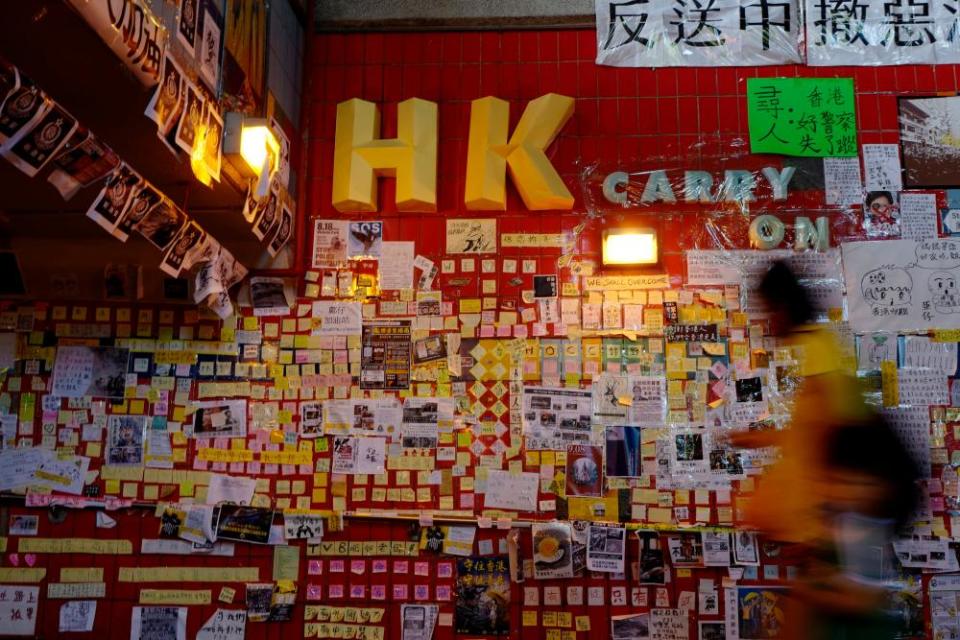From loo roll to dumplings: Hong Kong protesters weaponise purchasing power

Emily Mak works in finance but every lunchtime in the run-up to lunar new year on Saturday she heads to a bustling Hong Kong market street to distribute lai see packets to customers who have ordered them online.
Her packets – red envelopes used to hold a traditional new year gift of money for children – are emblazoned with pro-democracy messages. The profits of the more than 20,000 packets she has sold will be donated to young protesters experiencing hardship.
Related: Hundreds arrested at huge New Year’s Day rally in Hong Kong
Mak’s packages are an example of the ways that Hong Kongers find new directions to take their struggle for democracy into the economic arena.
Across Hong Kong even staunch supporters of the pro-democracy movement are counting the cost of the months-long conflict in which police have arrested about 7,000 and fired live rounds as well as tens of thousands of rubber bullets and more than 16,000 canisters of tear gas.
Mak’s lai see packets are part of the emerging “yellow economic circle” which encourages individuals to use their consumer power to sustain the movement and weaken China’s economic dominance.
“We have to help our own people,” Mak said. “So many people got beaten, wounded and arrested in the protests. We cannot stop our fight.”
China is the main supplier of a range of necessities in the city, from water, meat and vegetables to electronics and consumer products.
But now consumers can check lists of shops and restaurants perceived as “yellow” (pro-democracy) or “blue” (pro-government or pro-China) on mobile apps, compiled by pro-democracy supporters.
“I’m driven by my conscience. We don’t know if it would work, but we must try,” said Kevin Chan, 56, who bought lai see packets from Mak.
Adrian Kan, who participated in protests during most of the past seven months, said the injuries and arrests rendered the radical protests unsustainable and he now patronised “yellow” shops and joined a peaceful “Lunch with you” rally in the financial district of Central several times a week.
Related: 'Hong Kong is at a crossroads': inside prison with the student who took on Beijing
“The movement has definitely changed direction,” said Kan, an IT professional. “We need to maintain the momentum of our struggle in our everyday life and remind people that we’re not alone.”
Keith Poon, restaurant manager of the Trinity dumpling bistro, part of a consortium of “yellow” eateries called HKEconRim, said his restaurant’s business had soared after it joined the consortium in September. The dumplings made in his restaurant used meat from pigs bred in Hong Kong and pastry made by local shops.
“It’s more expensive, but we want to support local industries,” Poon said. “Red capital has long monopolised the market. Only by patronising our local businesses will the yellow economy have bargaining power in our struggle.”
Roy Tam, a pro-democracy politician, said Hong Kong’s economic reliance on China had enabled Beijing to wield considerable power in its affairs, and consumer power could change that. He helped his constituents buy toilet rolls to support a local paper recycler.
“Around 80% of toilet rolls sold in Hong Kong are Chinese products,” he said. “By forming an alliance with people who share our political views, we hope to reduce our reliance on China.”
The “yellow economic circle” initiative was dismissed by Hong Kong’s commerce and economic development secretary, Edward Yau, as an unsustainable fad and attracted the authorities’ wrath. A commentary in the People’s Daily, the mouthpiece of the Communist party, said: “It is an insult to the word ‘economy’ and a breach of basic human rights. It’s barbaric, coarse and full of antisocial, anti-civilisation tendencies.”
Related: Hong Kong could keep semi-autonomy for longer, says Lam
But the authorities’ criticism shows their fear it might just work, said Ho-fung Hung, a professor of political economy at Johns Hopkins University in the US: “Hong Kong and China are in an economic slowdown. The ‘yellow economy’ would give a lifeline to those which show support to the movement.”
He said value-driven consumerism, such as movements to encourage buying fair trade or organic products, was common around the world, as were socially responsible investment funds: “If Hong Kong people can successfully transfer their protest energy into this, it could work.”
Economists have said that while the “yellow economy” might have an impact on dining and retail sectors, it would be hard to have a presence in the city’s four key industries – finance, tourism, trading and logistics – which are dominated by China-linked businesses.
Kenneth Chan, a political scientist at Baptist University of Hong Kong, said that even if the cumulative impact on the overall economic structure might not be felt, the conscience-driven initiative was effectively “a form of protest in daily life which breeds a sense of self-determination and solidarity against the government”.

 Yahoo News
Yahoo News 